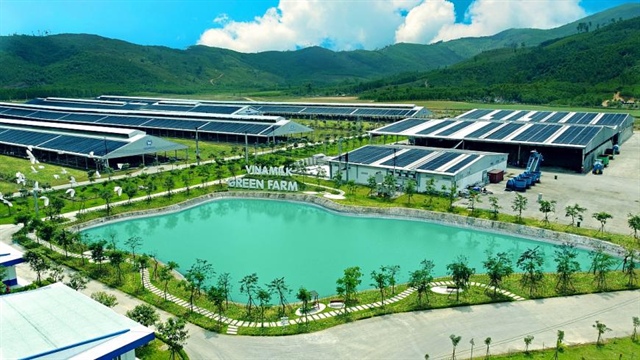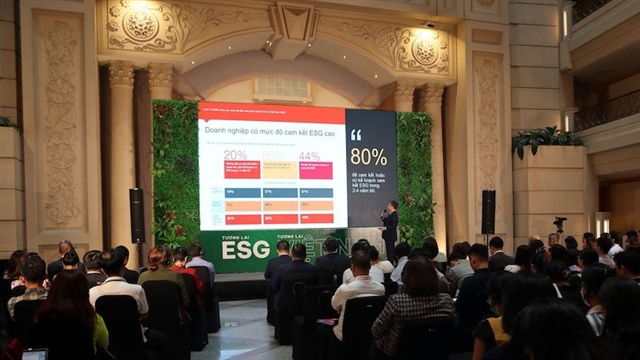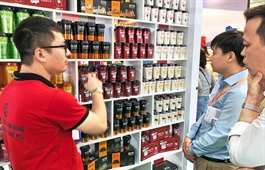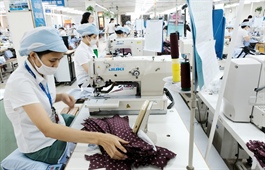Vietnam’s companies commit sustainable business practices: PwC Vietnam
Vietnam’s companies commit sustainable business practices: PwC Vietnam
Environmental, social, and governance (ESG) has become mainstream and is widely recognized as business critical in many countries, including Vietnam.
About 80% of Vietnam’s companies have made ESG commitments or plan to do so in the next 2-4 years, according to PwC Vietnam’s ESG Readiness Report.

Vinamilk, a leading enterprise in sustainable development in Vietnam. Photo: Vinamilk |
The report shows among the respondents, about 57% of foreign-invested enterprises have made explicit ESG commitments, while the remaining listed companies appear to have taken a “wait and see” approach. Interestingly, 40% of private family business respondents said they had made ESG commitments.
“This figure may underscore the strong sense of responsibility among Vietnamese NextGens that family businesses should lead the way in sustainable business practices,” the report noted.
The top reason for pursuing ESG is brand image and reputation (82% of respondents), while the second most cited reason is to stay competitive (68%). Others include employee retention, talent attraction, and increasing pressure from investors, shareholders, and the government.
Andrew Chan, South East Asia Sustainability & Climate Change Leader and Sustainability Strategy & Transformation Leader, PwC Asia Pacific Sustainability Centre of Excellence, said: “Having a good understanding of ESG without commitment or vice versa is meaningless. To build a better and more sustainable Vietnam, we need the collective commitment and collaboration between multiple stakeholders, including individuals, businesses, investors, entrepreneurs, regulators, the government, and the media.”
Bridging the knowledge gap among local enterprises
Over half of Vietnamese companies have yet to make any commitments or plans on ESG in the future and are small and medium-sized enterprises (SMEs). PwC Vietnam gave the figure, citing lack of awareness as the key barrier.
According to the report, the potential reasons for this are the recent lack of clarity around ESG information in the Vietnam market. This finding indicates a strong need for (pro)active dialogues between the Vietnamese government and the SME group, which will help improve the knowledge and gradually address the issue.
The findings also underscore the need for the business community in Vietnam to continually improve knowledge and execution on ESG, especially for the senior leadership team.
Only 29% of respondents who said that there is board involvement in ESG are confident in their Board’s capabilities on ESG matters. However, 43% said they have not considered training their workforce, and only 26% plan for board-level training.
Another challenge comes from the absence of transparent regulations, with nearly 70% of respondents admitting the issue. Over half (52%) found that the low-quality disclosures and counterparty awareness of ESG factors are also the challenges for businesses to include ESG factors in the enterprise’s risk framework. These are areas where clearer guidelines, a holistic country roadmap, and a level playing field for industries are needed for businesses here to advance their ESG strategies.
How to realize ESG commitments

Delegates attend the announcement ceremony of the PwC report. Photo: PwC Vietnam |
Statistics from the report highlight that companies here are on the right track while showing room for improvement in others.
For example, 66% have some ESG program in place, 49% have some formal governance structure, and 35% have active involvement from the Board of Directors in ESG matters. However, only 28% have comprehensive risk metrics to monitor progress, 71% report a lack of understanding of the data required for reporting, and about the same number have none or very limited external reporting.
Nguyen Hoang Nam, Partner, ESG Leader Assurance services, PwC Vietnam, said: “As with almost everything, taking the first steps along the ESG journey is daunting, but it will surely be rewarding. Success is not just about finance, disclosure, climate change, or diversity. It is about embedding these principles and more in your strategy and activities, including risk management”.
The report emphasizes the role of senior leadership in driving ESG commitments. The most significant impact in ensuring ESG is a priority is at the Board level, where Boards can help guide management in allocating appropriate resources and attention.
Dinh Toan Trung, Strategy Director of VIOD Academic Advisory Council, underlined: “The role of the board of directors regarding ESG issues is that of oversight. The board is a central player in overseeing and integrating ESG risks and opportunities in their organization.”
He added there is no “one-size-fits-all” approach for allocating ESG oversight responsibilities among the board and its committees, and the delegation of responsibilities may change over time. Board members should be prepared to discuss and address emerging ESG issues in the boardroom.
Hanoi towards a green economy
Hanoi is actively moving towards a green economy with high-quality production, clean processes, and environmental protection, thereby contributing to realizing Vietnam's national strategy on green growth in the 2021-2030 period, with a vision for 2050.
Over the years, the municipal authority has sought solutions to boost green production and consumption, reduce greenhouse gas emissions, adapt to climate change, and develop green technologies and resource-efficient industries.
Besides, many annual activities have also been underway toward a green and sustainable Hanoi.
During the 2021-2025 period, the city is committed to accompanying the business community in promoting industrial products using advanced and environmentally friendly technologies and high-added value, according to the Vice Chairman of the Hanoi People’s Committee, Nguyen Manh Quyen.
He added that the city has also supported local enterprises in the digitalization process for higher productivity and promoting new industrial sectors.






















